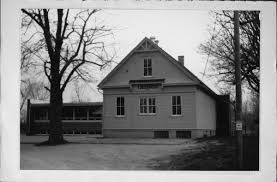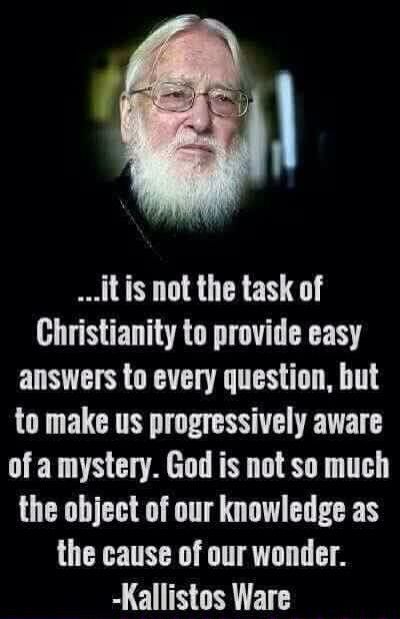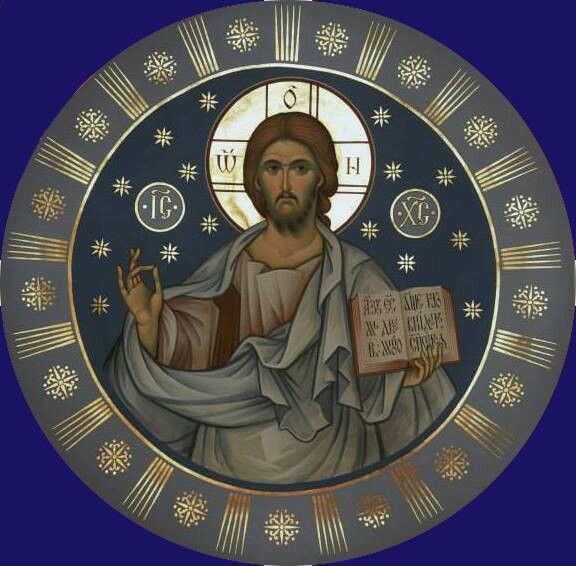Orthodox!
To begin where we left off last time: I was chrismated into the Holy Orthodox Church on September 16, 1989 by his Grace Bishop Antoun (may his blessed memory be eternal +) and ordained deacon and priest that same weekend! (Really? they all cried.) Their reasoning was that I already had over 20 years’ positive pastoral experience and had been determined to be sound in the Faith. I had a small congregation waiting, and if they sent me off to seminary they would all disperse. I thought at the time, “These people are taking a big chance!” But it worked out.
I won’t give you the history  of Saint Nicholas Church, Cedarburg,
of Saint Nicholas Church, Cedarburg,  but in the past thirty years we have grown from about thirty people in the basement of a dingy almost abandoned school building out in the country, to over 200 of us in a former Lutheran building in a charming old exurban town. God is good.
but in the past thirty years we have grown from about thirty people in the basement of a dingy almost abandoned school building out in the country, to over 200 of us in a former Lutheran building in a charming old exurban town. God is good.
… but still worried.
For a while after I became Orthodox, I kept looking behind pillars to see if I could find a heretic lurking somewhere, someone who didn’t believe the Faith. We certainly have our share of nominal Orthodox – folks who don’t pay much attention it. There are certainly Orthodox who incorrectly grasp parts of the Faith – for example, all of us! But nobody’s trying to change it. I have found not one person denying the Faith. Not one theologian, not one bishop, not one priest, not one layperson. Someone told me “Orthodox people just know who they are”. There is a whole different “dynamic” here than in the West. Don’t ask me to explain why. The Holy Spirit?
At my first Orthodox clergy symposium my fears were finally quelled. The theme was “Pastoral Ministry”. I knew that in my former denomination that would have opened the door for all sorts of peculiar things to emerge, so I waited… What in fact came out of the  mouths of the clergy was the Faith, the Scriptures, the Fathers, and nothing but. I felt like either standing up and dancing for joy or kneeling down and crying.
mouths of the clergy was the Faith, the Scriptures, the Fathers, and nothing but. I felt like either standing up and dancing for joy or kneeling down and crying.
Father Tom was right: “There is total theological unanimity in the Orthodox Church”, and now I am “just one of the guys”. This is the Church built on the Rock.
What has happened to me since I became Orthodox?
1 I got my self back. I told you last time that before I left my old Episcopal church, a woman said to me, “I just wish we could get the old Father Bill back” – which startled me. So did I, but I had become distrustful, narrow and focused on a few controversial issues instead of the Faith as a whole, negative and frustrated as we lost battle after battle, and control-oriented as I tried to find a way to recover the kind of Anglicanism I had believed in. Looking back, I see now that I became Orthodox for psychological reasons as well as for theological ones. I wasn’t myself any more. I needed to get my self back.
The Orthodox Church has many problems. I could spend the rest of this article listing them. But the Apostolic Faith is not one of them. The Faith really is established here and doesn’t need me to defend it.
But the Apostolic Faith is not one of them. The Faith really is established here and doesn’t need me to defend it.
So I learned to trust the Church. I did my pastoral work (not far different than when I was an Anglican) and try to save my own soul, and then watch Orthodoxy take root in people and change them and me for the better. Most Protestant teaching is that God does it all and my works didn’t matter, but I felt as if I was having to do everything. Now that I’m Orthodox where the teaching is that good works are necessary for salvation, I feel as if God is doing it all!
I began to relax and become my self again. More quickly than I had imagined, I became positive minded again and happy and enjoying life. (Orthodoxy, which to outsiders can sometimes look so forbidding and rigid and even cold from the outside, is so warm and cozy and nurturing on the inside.) I feel I’ve been growing spiritually again. I am more at peace in my soul than ever in my life. My body tells me I’m thirty years older, that’s for sure, but deep within me I feel thirty years younger.
At a funeral back in my old Episcopal church, I saw the woman who had once wished she could get “the old Father Bill back”. I think she could see the change in me. I told her “I’m back”.
2 I got my mind back. For better and for worse. Late in my Anglican days I realized that I could think only defensively about the Faith, forever lining up arguments against opponents. Which meant I wasn’t really thinking; I was just trying to score points. During war or as in American politics today, with sides lined up in bitterly opposing camps, real thinking ceases. All people do is just react and throw rocks at each other. Now that I’m Orthodox and don’t have to fight the old battles any more, I am actually able to think again, and I find I have more questions than I did before. It feels as if I understand God and the Faith less well than I did. I think this is partly because I have discovered (not to my pleasure) that much of what I once took for strong faith and deep conviction was just stubbornness: “I’ll be damned (literally!) if I’m going to let ‘them’ tell me Jesus isn’t the Son of God” or whatever. Also because Orthodoxy is showing me how unfathomably great God really is, opening up to me depths of faith and life and theology that I never even knew existed. I find it hard now to speak about God except to say “he is good and loves mankind” and that he is Father, Son and Holy Spirit, and I don’t know what that really means.
But that’s ok. The Fathers didn’t pretend to know either. They only drew a fence around the  Mystery. We Orthodox believe not because we can figure God out and explain him in a systematic fashion, but because we experience and perceive him and his work in our lives in the Body of Christ, in the Church, in the worship, in the Scriptures, in the sacraments, in the people. God and his Kingdom are almost palpably present at Divine Liturgy. God reaches out to me continually through the people of the Church. I have a profound new sense of the Church as the Body of Christ. I can’t begin to explain any of this, but I experience it daily.
Mystery. We Orthodox believe not because we can figure God out and explain him in a systematic fashion, but because we experience and perceive him and his work in our lives in the Body of Christ, in the Church, in the worship, in the Scriptures, in the sacraments, in the people. God and his Kingdom are almost palpably present at Divine Liturgy. God reaches out to me continually through the people of the Church. I have a profound new sense of the Church as the Body of Christ. I can’t begin to explain any of this, but I experience it daily.
All this has changed, for example, my preaching style. Once most of my sermons were designed to convince people of some theological or moral point. Now often I just tell the stories of the saints of the day, and try to make the Scriptures and seasonal themes come alive, instead of telling people what to think or what to do. Here I don’t need to convince anyone of anything. I just try to point them into the Mystery, lay the Faith out for people to see and experience for themselves. And they do. I doubt it’s because of my words.
3 How the world now looks to me. Someone told me that after I became Orthodox the world outside would seem ever stranger to me. Yes and no. In light of Orthodox emphasis on persons, love, mercy, compassion, I’m torn by modern America, where most people are so sweet and kind, but our public life is so nasty. We ignore so many who are poor, sick, homeless, hungry, refugees, people both born and unborn. In light of Orthodox emphasis on truth, the amount and effectiveness of propaganda and lying and willful disregard for facts sometimes tempts me to despair. So does the raw power of money in America today, considering how much Christ taught about the danger of greed. These things are so contrary to the Scriptures and traditional Christian teaching that they now seem to me more horrible than ever.
Despite this, for the most part I think we Orthodox should not condemn the world (Jesus didn’t: John 3:17) – especially remembering what the First and Second Century world was like. Rather we should love the world (God did: John 3:16) and try to seek what is good in it and draw it into the Kingdom. Our job is to believe and live our faith positively, not to dump on those who don’t. Orthodoxy gives us solid ground from which to think creatively about the world, its faults and its virtues, because despite our Old World appearance, the Orthodox Church is not “of the world”. Orthodoxy does not fit into contemporary religious and political categories. Orthodoxy is neither liberal nor conservative nor middle of the road. We come from somewhere else. We are ancient, international, multi-cultural, in fundamental matters super-cultural. Christ put us here to be a colony of heaven, living on earth but rooted in the the Patristic Faith, the Tradition of the eternal Church, the Gospel of Jesus Christ.
However, to my surprise in some ways the world looks better to me now that I’m Orthodox. Orthodoxy has made me more open minded and tolerant.
This is partly because the Orthodox Church has exposed this Anglo-Welsh-Irish-German-American to people of other cultures. Thirty years ago Greeks seemed exotic to me, and I knew nothing of Near Easterm Christians and their ways. They have all welcomed me, and now they’re my friends and “family”. To my surprise, I have not been “poor as a church mouse”, so we have had money to travel. I have seen that there are other and sometimes better ways of seeing and doing things than my old Anglo-American ways.
 Also I have become more open to the world because Orthodoxy emphasizes that the Holy Spirit is “present in all places, filling all things”, that Christ is God “filling all things…boundless”. So Orthodoxy has led me to view people not so much according to whether they’re Orthodox or Christian or American or even religious, but according to whether they bring love, goodness, truth, beauty, joy, kindness, peace into the world. If they do, God’s Holy Spirit is present at work in them, whether they know it or not. I’m learning that God can work through people I disagree with, even disapprove of. “Many who are first will be last, and the last first.”
Also I have become more open to the world because Orthodoxy emphasizes that the Holy Spirit is “present in all places, filling all things”, that Christ is God “filling all things…boundless”. So Orthodoxy has led me to view people not so much according to whether they’re Orthodox or Christian or American or even religious, but according to whether they bring love, goodness, truth, beauty, joy, kindness, peace into the world. If they do, God’s Holy Spirit is present at work in them, whether they know it or not. I’m learning that God can work through people I disagree with, even disapprove of. “Many who are first will be last, and the last first.”
4 How Christianity now looks to me. Maybe to contradict what I just said, I find that being Orthodox has made me less sympathetic to some other kinds of Christian groups. Not to their members, who are almost always good folks, well-intentioned. As Professtor Casserley told us years go, “Most people are better than their theology.” And God knows we Orthodox are worse than our theology.
However, are the various denominations getting odder, or is it that I now have a higher standard of comparison? Orthodoxy seems to me so broad, so full, so deep, so rich, so fulfilling in its faith and life, so organic, to unitive, so “put together”, and these things seem so self-evident and natural to me now, that I get distressed when others diminish and narrow and compromise God and Christ and the Church, or even make them seem ludicrous. I think too much of American Christianity today, both liberal and conservative, hinders people from coming to the real Jesus Christ. Being Orthodox has also made me less tolerant of ideologues who set up human political and religious and economic systems, whether of the right or the left, or even themselves! and then treat them as absolutes, as if they’re divine revelation. Only one thing is absolute: God.
5 Do I miss Anglicanism? Yes, I sometimes get homesick for Anglicanism as I knew it – but not as it is now. It has changed so much, has officially accepted gay bishops and priests, liturgical regression and so much more. I’ve gone back to my former parish for funerals. It is not mine to criticize any more. But Orthodox worship has such depth and “soul”. It took me a while to get accustomed to Orthodox people and their ways – somewhat different, shall we say, from more restrained Anglos. But here I have found so much love. Also I’m still trying to recover from Western legalism and work my way into the Orthodox non-legalistic approach to theology and living.
But… I remember our old Anglican Christmas. The above is perhaps a bit more elaborate than at our little Saint Boniface Church! The service of English carols and readings, and then at Midnight the bells would ring out and the incense and procession would come down the aisle: “O Come, all ye faithful…” and High Mass would begin. Do I miss that? I do. Traditional Anglican music, very different from ours, can be lovely.
But would I go back? Not “for love nor money”. Even though in some places the ceremonial remains, it’s hard now to know what theology or morality lies behind it all. Any Anglican parish priest today is building on sand. No matter what his theology or liturgical style, the next priest might well turn it all upside down.
Not here! I’ve always known that my successor at Saint Nicholas, Cedarburg would not overturn my work – no, our work, all of us at Saint Nick. I knew he would have his own personal style and skills and strengths and weaknesses, just as I did. But I never doubted that he would be Orthodox – and so he has been. Father David believes and teaches the same Orthodox faith, he celebrates the same Orthodox services in the same way, and the tradition of Saint Nicholas Church, which is simply the Orthodox Tradition, continues. Here we have built something that will last. Thank God and thank the Orthodox Church.
And so when my time comes I will die a happy man. But not yet, please, Lord. Life is harder as I get older, but it is worth living. If it may be permitted, I would like to live on to enjoy Orthodoxy and the people of Saint Nicholas Church, and my wife and family, for a while longer. Maybe long enough to write a paper entitled “Forty Years Later”? If God wills.
Forgive me for going on so long, but looking back from Thirty Years Later, so many good things have happened to me. I haven’t begun to tell you all of them.
Next Week: We begin a new series on The Divine Liturgy.

Amen!
I was chrismated myself just this past Spring, on Forgiveness Sunday. Several years ago my wife asked me “why do you always leave church angry?” It’s not that my old church was theologically veering off, not like you saw in the Anglican church, but from one week to the next I had no idea what theology would be preached at all, and the service felt anything but worshipful – 20 minutes of very shallow emotional singing, some announcements, and then a 45 minute lecture. Legalism was something of a problem, and the pastor might be veering headlong towards Calvinism one week based on a single verse in Romans, then spending the next week backtracking hard based on the very next verse. It wasn’t worship, it was mining the minutia of text for the “right” understanding of God as though salvation hung on the right hermeneutics of a single verse, and all without any sense of the life or continuity of Christ, nor any interest in healing.
Orthodoxy has been like a spiritual life raft for me, and a lot of how you say you’ve changed has been similar for me. I never knew how to live or to pray as a Christian. Like you, in light of all I’ve learned and touched I find America increasingly strange to me. Words cannot express it all, of course, though you’ve hit as close to the mark as any could.
“most Americans sweet and kind”? Father, not in my experience. Most Americans use political force to rob their neighbors, to serve mammon at their expense, and to busybody in other’s affairs, as Peter condemned. You know, like telling them how they can and cannot defend their life and family. It’s the disease of the “tyranny of the majority.” With the debt we have, we are robbing our great grand children, too. Isn’t it strange that the people who wish to do what they lawfully will with what is their own are portrayed as the greedy, money hungry ones, and the ones who wish to rob them are the “generous, civic minded” ones? And yet political conservatives give so much more than the illiberal liberals.
It must be different here in Wisconsin.